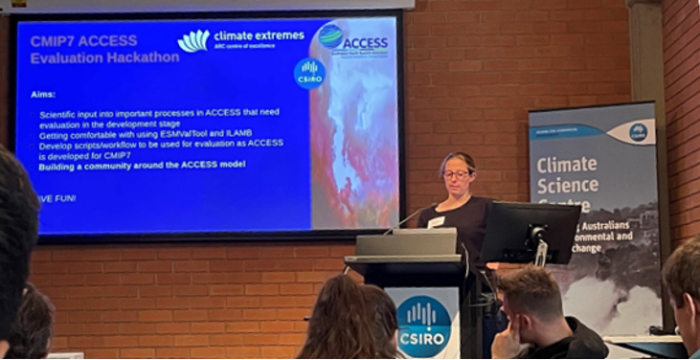Written by Angela Kaplish and Laure Poncet
Last week, researchers from the ARC Centre of Excellence for Climate Extremes, CSIRO, the Climate Systems Hub, the Australian Community Climate and Earth System Simulator-National Research Infrastructure (ACCESS-NRI), the Bureau of Meteorology, the Centre for Climate Research Singapore and a range of Australian universities participated in a hackathon to evaluate Australia’s climate model ‘ACCESS’ and provide scientific input for the Coupled Model Intercomparison Project 7 (CMIP7).
CMIP is a collaborative project used in every round of the IPCC’s (Intergovernmental Panel on Climate Change) major assessment report. Each round of the CMIP project provides climate projections, produced by climate modelling groups around the world, without which, we do not have the updated climate information needed to understand future climate change impacts.

Dr Nicola Maher kicking off the Hackathon in Aspendale, Victoria this week. March 2024. Source: Dr Paige Martin.
During the three-day hackathon event, climate scientists incorporated the latest science for evaluating Australia’s climate model contribution to CMIP7. This involved developing testing procdures and discussing the types of simulations we need to do a robust evaluation of the model.
Dr Nicola Maher, Chief Investigator at the ARC Centre of Excellence for Climate extremes, said: “The aim is to provide scientific input into this important evaluation and development process of the ACCESS models that need evaluation. It’s a chance to build a community around the ACCESS models.”
With the help, support and guidance of data scientists from the ACCESS-NRI, who support development and research on Australia’s climate models, and the National Computing Infrastructure (NCI) home to the GADI supercomputer, the event was a chance to collaborate to make the processes as efficient as possible.
“It’s a chance to get comfortable with using modelling tools and develop software to be used for evaluation as models are developed for CMIP7,” said Dr Maher.

Dhruv Bagtani, PhD student at the ARC Centre of Excellence for Climate Extremes, said: “The hackathon provided tutorials on using different modelling testing and evaluation tools as well as several opportunities to break out into smaller groups for more hands-on experience.”
The event was also an opportunity plan the next steps for an efficient and streamlined process of model development and evaluation.
“There was a lot of discussion on having regular meetings to share our evaluation work and findings so that all the working groups are on the same page and work collaboratively,” said Aditya Sengupta, PhD student at the ARC Centre of Excellence for Climate Extremes.
There have been six CMIP projects to date with work currently in development on the design of CMIP phase 7 (CMIP7). CMIP6 had more than fifty modelling groups participating around the world with results informing and shaping policy decisions worldwide.
